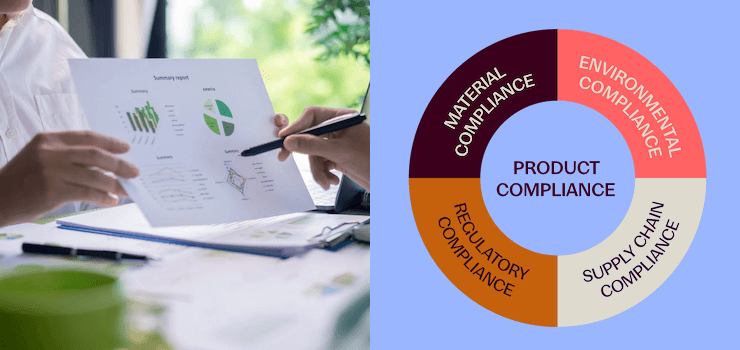More than 65% of consumers are worried about climate change, and take social and environmental impacts of products into consideration when making purchasing decisions. For manufacturing companies, a lack of social and environmental sustainability can destroy the competitiveness and damage reputation and trust. It’s no wonder, then, that in recent years we’ve seen many leading manufacturing companies announcing their commitment to responsible sourcing, climate action, and transition to a circular economy – as their long-term strategic objectives. We can see entire industries focusing on decarbonization and setting targets in line with the UN Sustainable Development Goals (SDGs).
Governments continue to issue more regulations more often. Countries, states, and cities are releasing long-term sustainability roadmaps, and starting to set firm targets and deadlines for carbon neutrality and the Circular Economy. The EU Green Deal is a prime example where investments in sustainability initiatives are paired with regulatory frameworks. Circular economy and critical material strategies are also on the agenda, driving the demand for more transparency and reporting.
Investors are demanding more transparency regarding sustainability performance – a trend that becomes clear when we observe the rise of ESG investing. In the past four years alone, the value of those assets that are applying environmental, social and governance data to drive investment decisions has doubled to $40.5 trillion.
Digitalization and collaboration
A quick glance at our smartphone screen shows us that we live in a digital world and are heavily connected. Information shapes markets and drives decisions. It’s not just individuals, however.
Entire industries are increasing their reliance on digital technology. The “fourth industrial revolution” – Industry 4.0 – is about connectivity, and it brings together many innovations we can already see in action and which are expected to have enormous implications for any industry: Machine Learning, Artificial Intelligence, Internet of Things, Blockchains, Big Data, Automation, Robotics, Sensors, etc.
Today, we have more knowledge about products, industries, and supply chains than ever before – and this has exposed just how complex they are. To survive and thrive, organizations need the ability to adjust quickly, and work collaboratively. No organization can become “circular”, “digital”, or “sustainable” on its own. For a typical vehicle produced today, more than half of parts and components are produced by the supply chain. Consequently, to ensure that a product is ethical and carbon neutral, companies must work very closely together and share more data than ever. Interestingly, the need for more collaboration has increased the speed of technology adoption to enable value chains manage the complete product life cycle, and account for everything that matters.
Conclusion
iPoint started in 2001, riding the waves of conquering material and substance compliance challenges, has been growing with our customers to manage ever-changing, more stringent, and new types of regulations. iPoint has been managing more exciting and challenging sustainability requirements in the new circular economy framework. We have accumulated vast technical knowledge and expertise and developed many products and solutions for our customers in various industries. We are eager to work with our existing and new customers and embrace future opportunities.
We cordially invite you to leverage iPoint’s ever-growing ecosystem to work together throughout the supply chain, increase resilience, create shared value, and use cutting-edge technologies to secure a circular, sustainable world for future generations.
This article is the ninth and last article in our series of nine articles dedicated to the topic “From Compliance to Sustainability – Managing Material Lifecycle in the Circular Economy Era”. It is addressed to senior decision makers, managers, compliance officers, engineers, and any corporate citizen interested in the most important steps of your journey from compliance to sustainability. Starting with material compliance, we will explore the entire material life cycle and the connections between corporate sustainability goals, circular economy, and digital technology. Thereby, we will lay the focus on business processes, IT solutions, and the utilization of data as the three key elements which – in combination with sustainability and the circular economy – create greater value for companies and their value chains.
About the authors
Maroye Marinkovic is the Product Innovation Manager at iPoint, where he brings in his skills as a solution designer, digital strategist, and a communicator with a passion for improving sustainability, efficiency, and compliance across value chains. Based in Melbourne, Australia, he has more than 10 years of experience in conceptualizing, designing, and implementing enterprise compliance, sustainability, and risk management software solutions. Maroye’s specializations include chemicals management, platform design, blockchain solution design, circular economy, and business strategy.
Dr. Bing Xu joined iPoint in Ann Arbor, Michigan, at the North America main office in 2019 as Director of Business Innovation. In this role, he supports iPoint’s customers in different industries with their material compliance programs as well as their sustainability, circular economy, and digital twin projects, to integrate material compliance programs into their core product development processes and reduce non-compliance risks and improve engineering efficiency.
Before joining iPoint, Dr. Xu was Ford Motor Company’s Global Materials Compliance Program Manager. Spearheading Ford’s Global Materials Management program in early 1997, he was one of the original OEM members who developed and launched the International Data Management System (IMDS) for the automotive industry in 2000. He was Ford’s global attribute leader for material/substance compliance and material life cycle management, and a member of Ford’s Sustainability Council, managing both internal compliance and external suppliers’ compliance. He also led Ford’s cross-functional teams and developed various material compliance-related processes and IT tools for Ford since 1997. Furthermore, Dr. Xu was the owner of Ford’s Restrictive Substances Management Standard (RSMS) and the owner of the Ford’s internal material/substance compliance processes/tools.
He has served as chair and co-chair in several committees of leading industry organizations and work groups, such as the US Automotive Industry Action Group (AIAG)’s Chemical Management Advisory Group, the United States Council for Automotive Research (USCAR)’s Substances of Concern Group, the Global Automotive Declarable Substance List (GADSL)’s Steering Group; and he has supported projects of the US Environmental Protection Agency (EPA) on Alternative Assessments, and TSCA industrial data collection and evaluations.
A recognized and highly respected expert of the automotive industry, he has been invited to speak at many conferences and forums hosted by different industries and governmental agencies, e.g., Electronics, Building Materials, Heavy Machinery, Chemicals, Apparel, Home Appliances, California Safer Consumer Products and Alternative Assessment conferences/workshops, and SAE US Government Industry Meeting.






